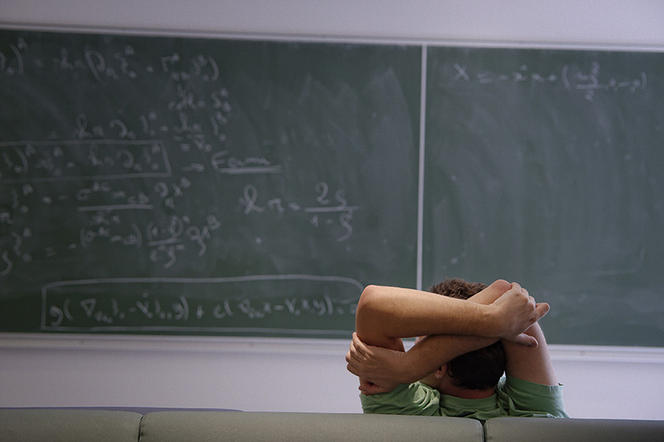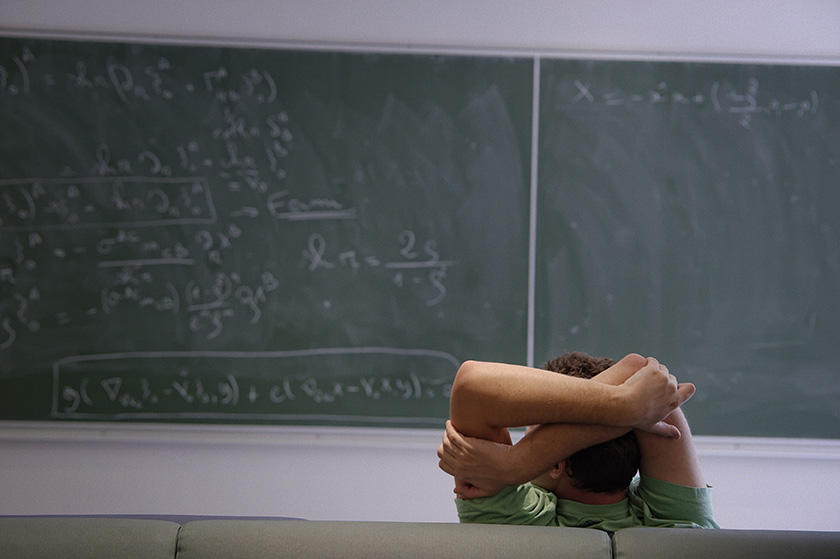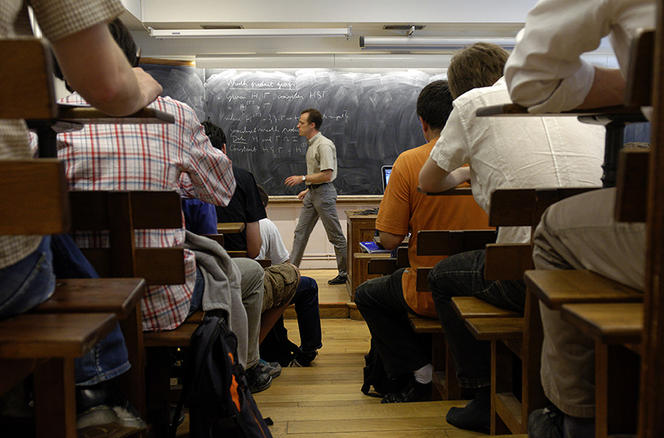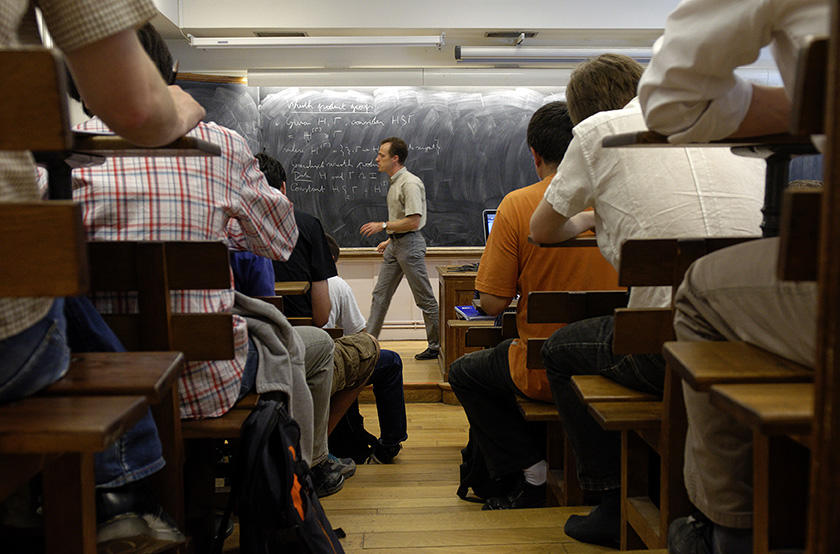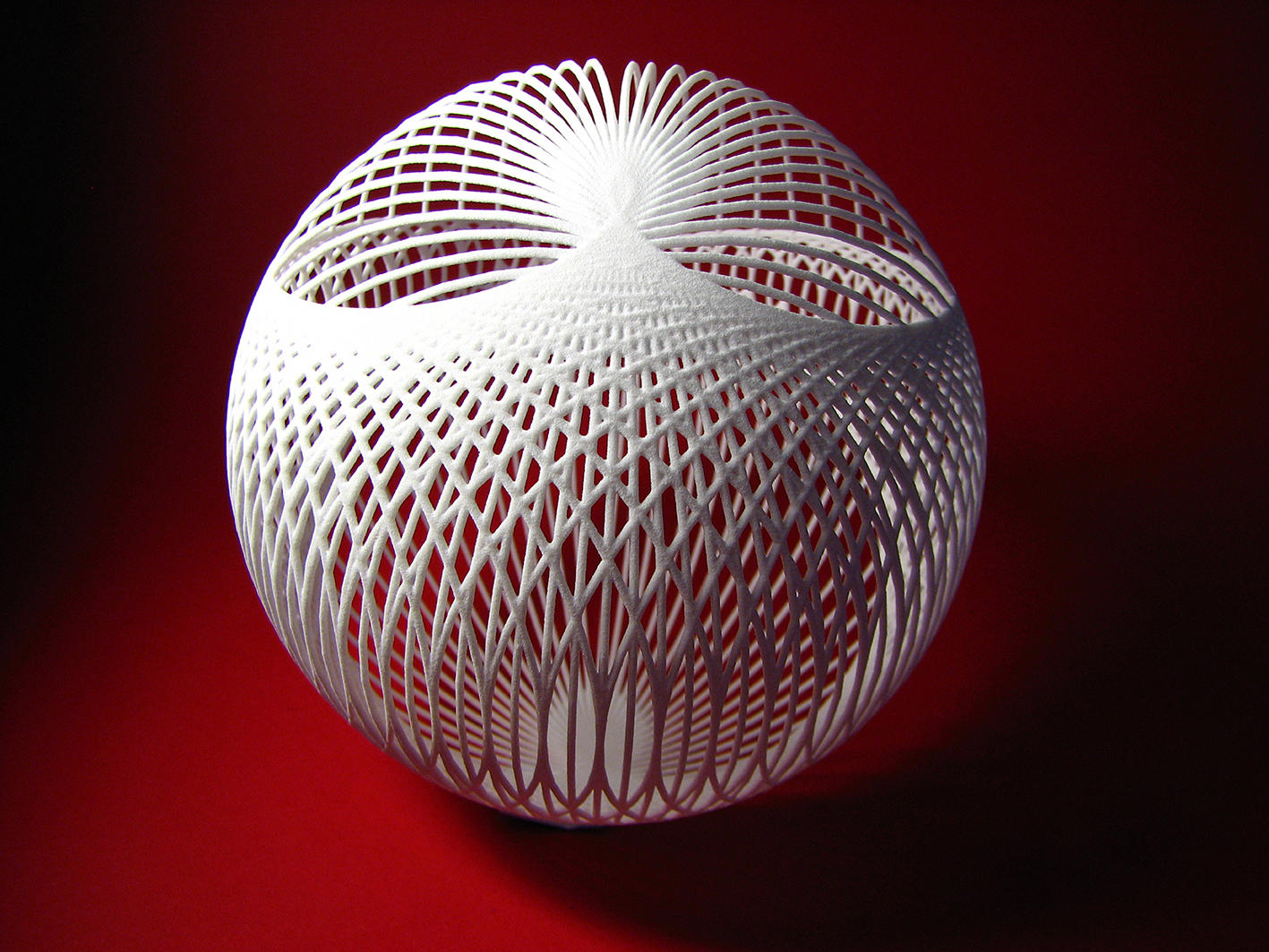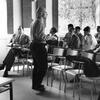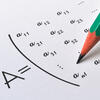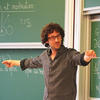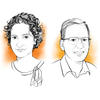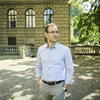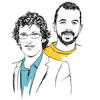You are here
Villani and Ávila: Two Men that Count
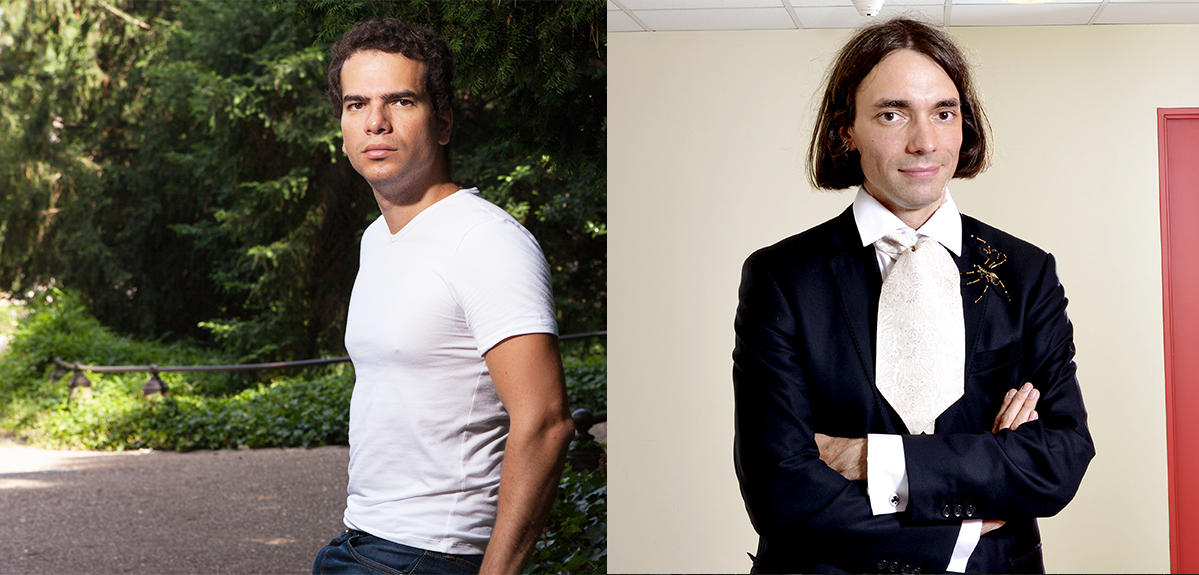
Christoph Sorger: Cédric Villani1 and Artur Ávila,2 did winning the Fields Medal change your life?
Cédric Villani: At first, when I was asked this question in television interviews, I used to answer, “It’s too early to say—time will tell.” A few years on, I can assert that it has definitely changed my life. Beyond the advancement of my career, the Fields Medal has proved to be an important social and media stepping stone. It has also given me the opportunity to communicate about my research and develop projects that would otherwise have been impossible. People often approach me in the street to talk about mathematics. They tell me they don't understand the first thing about it but enjoy hearing what I have to say, or that they would love me to give a talk at their school, university or company. Over the years, I have come to realize that researchers are very popular and many would like to see them play a greater role in the public sphere. As it dawned on me, I remembered the words of John Nash, one of my heroes in mathematics.3 I have tremendous admiration for his work, especially on the regularity of partial differential equations. He never won the Fields Medal, but accomplished more than enough to deserve it! He never got over it though. “It would have changed my life,” he kept saying, years later. The first time I read that, I thought that Nash was over-reacting. He was one of the very few scientists to have a Hollywood film made about him in his lifetime. But once you win the prize, you realize that it comes with many unforeseen expectations and potential, even more so outside the community than inside it.
Artur, you received the medal more recently, in August 2014 in Seoul. Tell us about your experience.
Artur Ávila: Immediately after the event, there was obviously a bit of pressure to talk about it, especially in the media. There seems to be much greater interest in mathematics in France than in other countries. It’s odd that the French value a prize like this one so much—I don’t know why it’s different elsewhere. I am particularly keen to make the most of this opportunity to promote mathematics in my native country of Brazil: things are on the right track there for the moment, but no one knows what the future holds. The next International Congress of Mathematicians (ICM) will be held in Rio de Janeiro in 2018. I see it as a kind of duty for me to be on hand, doing whatever I can since I’m not especially good at that kind of thing, and to help boost the image of mathematics in the collective imagination.
When I came back from the congress in Seoul, colleagues from other disciplines asked me, “Why is France so good at mathematics?” I also frequently hear this question from journalists. Cédric and Artur, what would you answer?
C.V.: First of all, I want to comment on what Artur was saying. It is true that people in France always listen to intellectuals. Some complain that this voice is no longer strong enough in the public sphere, but if they go to the US, they'll see that the situation there is much worse. In our country, research is seen as highly prestigious, especially mathematics. Quite some time ago, the various scientific disciplines used to be classified, with math topping the list. This created a lasting impression. Even those who have no affinity with mathematics think of it as the most illustrious and respectable discipline of all. History played a significant role: in 18th-century France, the Enlightenment considerably improved the level of mathematics, and the country spawned a host of high-caliber mathematicians. Then came the French Revolution, and with it a new set of ideals: the need to make things absolute, to redefine the units of measurement of time and space, to reform everything. There were plenty of missions for mathematicians. Then Napoléon came to power—the mathematician-leader, or in any case by far the most mathematically-minded leader France had ever had—and did everything he could to promote the discipline. That initial impetus kept going with a plethora of scholars in mathematics, especially in Paris, perhaps right up to the disaster of World War I, which was the only time when France’s international position was weakened. But it is also a matter of mindset and culture. When my foreign colleagues ask me, “What is it about your country and mathematics?” I tell them, “Math is about seeking ultimate truths, as abstract as possible, and explaining them to the entire world. The French, who are forever convinced that they are right, spontaneously do this in every field!”
Artur, what is your opinion from a Brazilian point of view?
A.Á.: Tradition is indeed important, and the fact that France has a long history in mathematics attracts researchers the world over.
I obviously came here because France has a top-level, dynamic school of mathematics. The discipline should be promoted at various levels of society, and this is the case in France, notably as regards selection. I understand that math is key in that process, encouraging students to study it at an advanced, higher level than in other countries. They do it because they have to in order to achieve their goal. Once they are familiar with the discipline, some make a career out of it.
Outside of France, one can discover mathematics in various ways. The Olympiad,4 for example, works very well in Eastern European countries and in Brazil. That's what prompted me to study math, whereas in France this competition is unheard of. For some, the Olympiad is just a game, but for others it’s a real passion, the opportunity of in-depth studies.
C.V.: I concur with Artur. I never participated in the Olympiad or even the Concours Général.5 But the system itself encouraged me to forge ahead—I liked math, so I continued in that direction. I took a preparatory course and was able to join the École Normale Supérieure (ENS)… I never had second thoughts—I was happy to follow the process. And, to a large degree, it paid off! One of the reasons it works is that we have a whole array of institutions. Of course, the grandes écoles system produces its share of international achievements. I'm not saying that it’s the only important network though—far from it (I myself am a professor at a regular public university)—but, as a catalyst for the most motivated students, they play a sizeable role. All French Fields laureates, except Artur, studied at the ENS. Along with Princeton University, it’s the institution that has produced the greatest number of Fields medalists at the international level. It’s also worth noting that French mathematical research is highly structured, regimented locally by rules that the researchers set for themselves, and more generally by the CNRS. I think it’s the discipline that is most inclined to recognize the CNRS as a guiding authority, and we all value its role as a coordinator. Its geographic organization is well planned out—in this sense, my own experience provides a perfect example: I have divided my career between Paris and Lyon, and the fact that I spent nine years at the ENS in Lyon shaped my scientific interests and mathematical production. Lastly, the researchers have adopted good practices, such as avoiding local recruitment as much as possible, taking care to develop a given discipline and avoid creating secluded, isolated specialisms, as well as facilitating young researchers' mobility, which works well.
I’d like to comment on what Artur said about the internationalization of the discipline. There were four Fields medalists in 2014, when Artur received the prize, and none of them work in their native country. The Austrian Martin Hairer is based at the University of Warwick in the UK, the Canadian Manjul Bhargava is in the US , along with the Iranian Maryam Mirzakhani, the first woman to receive the Fields Medal, who teaches at Stanford University. I think this award was very important for Iran—the country's president even tweeted a photo of the laureate. What about Brazil, Artur? I believe your medal was a cause for celebration in Rio de Janeiro…
A.Á.: Yes, it means something special there because Brazil doesn’t have the same kind of research tradition. Brazilians outside the scientific community often wonder whether it is even possible to do math or high-level science in Brazil. I decided to go into mathematics after the Olympiad competitions, because the event brought me in touch with the IMPA national mathematical institute and its top-level mathematicians. There were international exchanges, and it was rather easy to meet Fields medalists. It’s important for Brazilians to know that their country hosts this type of high-flying activity. It could entice them to pursue mathematics, which is perhaps the most important thing. Will there be other winners? It’s difficult to say what will happen in terms of education, due to the problems the country is facing. It’s possible to achieve excellence in mathematics because it neither requires much funding nor organization, and it doesn't depend on big laboratories. Many researchers work in isolation, in small groups. The educational obstacles are far more difficult to overcome. Brazil is a huge country with structural problems, but I have a little hope that my winning the medal will motivate people. I read somewhere that more undergraduate students are now taking an interest in math. We'll see—it’s early days yet.
Indeed, we need a little perspective. When people talk about your field, Artur, namely dynamical systems, which is also a strong point in Brazil, they think of Henri Poincaré. Do you see a continuity between his work and yours?
A.Á.: Poincaré was undeniably one of the pioneers in dynamical systems. The IMPA often recalls that he wrote a thesis in the hope of winning a prize offered by King Oscar II of Sweden, and made impressive advances in the field of celestial mechanics in the process. After receiving the accolade, he continued to investigate the subject and noticed that he had made a mistake. Since his thesis was already published, he asked that it be withdrawn. I don’t know the details, but apparently he had to pay the expenses, and ended up with no money from the prize. Poincaré realized that dynamical systems were much more complex than he had originally thought—he discovered the existence of “homoclinic points.” It’s a tough one to explain, and he himself couldn’t manage it! So I won't try to sum up what he didn’t succeed in describing in his thesis… We are still making discoveries in this field. I could say that there is a rather natural continuity between these efforts and attractors, the dynamics of quadratic applications—the subject of my dissertation—and all those being studied today.
Indeed, there is a real continuity. What do you think, Cédric?
C.V.: I’d like to add to what Artur was saying. Gösta Mittag-Leffler, the great Swedish mathematician who worked with Poincaré, recovered all the copies of Actes Mathématiques, the journal in which his findings had been published, and pulped them except for two or three copies that are preserved at the Institut Mittag-Leffler today.6 Poincaré paid for their destruction, which cost him more than the amount of the prize money. It makes a good story when you have that kind of unexpected outcome and the element of human error: it shows that Poincaré was fallible, like all of us, even though he was without doubt the greatest mathematician of his time. Personally, what strikes me is not so much the dynamical systems but his desire to develop physics and mathematics right from the start. In the early 20th century, he outlined visionary programs on what the study of partial differential equations would become. In fact, since he had a hand in everything, nearly all mathematicians can find a connection with him. Poincaré was a unifying force in the scientific community: he studied mathematics and physics, he was an engineer, he practiced philosophy… And everyone knew him—he had that universal side. Another aspect I can relate to is the importance he gave to communication: he wrote scientific texts and contributed to publications aimed at explaining science to children, in what we would still consider a modern approach. That's why at the Institut Henri-Poincaré, inaugurated in 1928 but 'refounded' just over 20 years ago, we develop every facet of mathematical research: first through contact with guests who come from around the world to explore a constantly renewed range of topics; then by providing logistical support to associations and institutions that promote French mathematics; and finally through communication targeting all segments of society. To mention an example related to Olympiad-type competitions, we collaborate with the International Kangaroo Mathematics Contest, which gives laureates the opportunity to meet prominent researchers, Fields medalists, etc.
We are very keen to foster a culture of mathematics. It’s important for our society, which over the past 30 years has seen the emergence of this discipline and its interaction with others in key areas. Cédric, in Seoul we saw a presentation on an extraordinary application: medical imaging.
C.V.: The French mathematician Emmanuel Candès, who works at Stanford, explained how his research in statistics and artificial intelligence, and more specifically on parsimonious methods, has found remarkable applications. It was impressive from a mathematical point of view, but also important for medical purposes. Magnetic resonance imaging (MRI) is one of those now-commonplace operations that are based on a mathematical principle, even if we are not aware of it.
An MRI examination uses magnetic rays to make an image, similar to a Fourier transform, an object well known to mathematicians and which is then inversed to reconstruct the image of the organs. With today’s systems, gathering the data takes two minutes, during which the patient must remain completely still. For a sick child, this can be a long time. Candès explained to us how, as a result of a partnership with physicians, he was able to use his expertise in the reconstruction of missing information to bring down this two-minute period to only 15 seconds, which has obvious advantages.
In his work with various collaborators, including Terence Tao, he showed that, in most instances, obtaining a usable image requires much less data (only 2% in some cases) than that usually collected. Examples like this one illustrate a sad truth of the modern world: it is a challenge to dig out the relevant information from the huge mass of data.
In 15 seconds, doctors can now do a scan that would have been impossible before—that’s significant progress. Here’s another example that dates from antiquity: the ancients didn’t ask themselves whether the Earth was flat or round. They knew it was round, but wondered how they could calculate its circumference.
C.V.: We owe the answer to Eratosthenes, one of the five mathematicians of Ancient Greece who set the standard for millennia in terms of cultural references. He had found out that on certain days of the year, the sun was reflected on a perfect vertical axis in a certain well, and subsequently obtained the Earth’s circumference by applying the basic rules of trigonometry. His calculation was clever and precise, with an error of less than 2%, demonstrating that mathematical reasoning and calculation can change our representation of reality. His approach also shows that intuition is more important than technique. This striking example proves that a certain amount of mathematical technology, combined with good intuition, can achieve results that might not transform our everyday lives, but nonetheless refine our knowledge and change our perception of our environment. It is also a reminder that the mathematical sciences were created to solve the problems of the world around us.
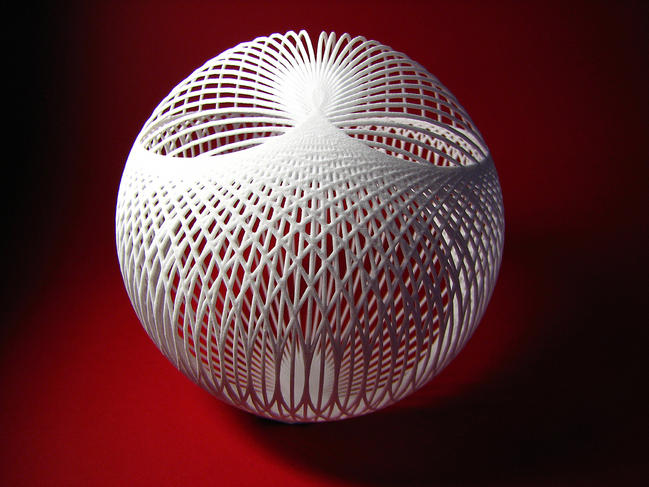
Artur, the Fields Medal is only awarded to candidates under the age of 40. It’s understood to reward a brilliant early career. What kind of research do you want to pursue now?
A.Á.: I don’t like to think of grand projects for the future, because I generally see things emerge in a much more natural way, just by doing my day-to-day work.
We study, we try to improve our understanding, we encounter small problems, we analyze them… In the course of this daily routine, we may come across something that we identify as potentially useful in a different context. Therefore, real breakthroughs don’t come from focusing directly on the big issues. By looking elsewhere, we can spot other mathematical objects, and they become new topics of research. I have never been able to tell where I will be in five years' time.
I believe—or at least I hope—that the Fields Medal will not change my way of doing things. I keep trying to enhance my knowledge of the objects that attract me, while being prepared to identify other important problems whenever relevant. And I’m constantly in touch with colleagues who introduce me to other interesting ideas.
Indeed, mathematicians don’t usually like to tell what they plan to accomplish because they don’t have a clue. Often, they’ll be working on a given subject when another one comes up, and they realize that what they’ve been doing can solve the new problem, which they wouldn't have suspected a year earlier. This is quite common among mathematicians! So it’s not always easy for us, when writing proposals, to anticipate what we will do. There’s one last question that seems important to me, concerning the renewed interest in math. What kind of message should we send to schoolchildren and university students? How can we encourage them to get into this fast-developing field?
C.V.: Artur and I seem to be doing quite well… I have never regretted devoting myself to this career and I think the same is true for Artur. Generally speaking, research is an intellectually satisfying field, in which you are constantly met with surprises. It leads to a lot of other things. Becoming a researcher is an end unto itself, but it can also be a stepping stone to other careers. Today, people are more conscious of this, and it’s even the underlying concept of events focusing on innovation. We know that doing a dissertation develops qualities that are useful in all types of professional activities, especially entrepreneurial ones. And it also benefits society! A while ago, the Deloitte consulting firm conducted a study that created quite a stir: it was estimated that about 16% of Britain’s GDP was directly dependent on mathematical research. The study was repeated in France and its results were roughly the same. Mathematical disciplines have a significant and growing impact. That should encourage young people to start a career in math. But the most convincing argument is just to tell them “if you like math, then keep doing it—take it further, because you can achieve wonderful things.”
A.Á.: Personally, I am not so much driven by the potential applications… I would say that it’s important to promote the idea of creativity. Math can be presented in several ways. It can seem rigid and lifeless, with set, dull rules. Yet it’s those rules that allow us to be creative. Everyone knows how to perform the mechanical functions—you don’t need to be a good mathematician for that. What makes the difference between successful and unsuccessful research is creativity. In mathematics, we don’t face the constraints of the physical world, which brings the discipline much closer to the artistic realm than to the hard sciences like physics.
C.V.: I think Artur is right: in recent years, the two issues that I am most often asked to address are innovation and creativity. For many people, talking to a mathematician is a good way to generate ideas on the latter. And I’d like to conclude by aptly quoting Poincaré: “it is by logic that we prove, but by intuition that we discover; without it, the geometer would be like a writer well-versed in grammar but destitute of ideas.”
- 1. Director of the Institut Henri-Poincaré (CNRS / Université Pierre-et-Marie-Curie).
- 2. Member of the Institut de Mathématiques de Jussieu-Paris Rive Gauche (CNRS / Université Paris-Diderot / Université Pierre-et-Marie-Curie).
- 3. John Nash died on May 23, 2015, four days after receiving the prestigious Abel Prize. Cédric Villani paid tribute to him on his blog: http://cedricvillani.org/breve-rencontre-in-memoriam-john-nash
- 4. The International Mathematical Olympiad, or IMO, an annual competition for secondary school students.
- 5. A prestigious annual academic competition held in France for students in the final two years of secondary school.
- 6. These copies had been lost and were found in Lund, Sweden a few years ago. They have now been returned to the Institut Mittag-Leffler.


